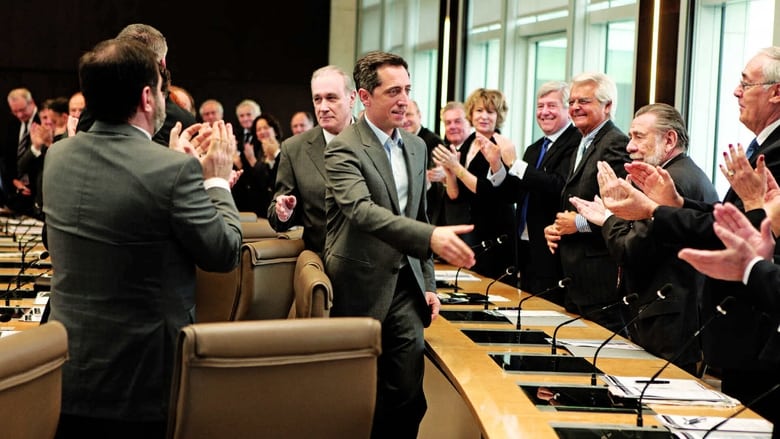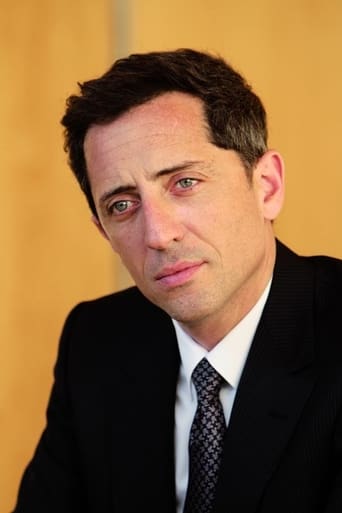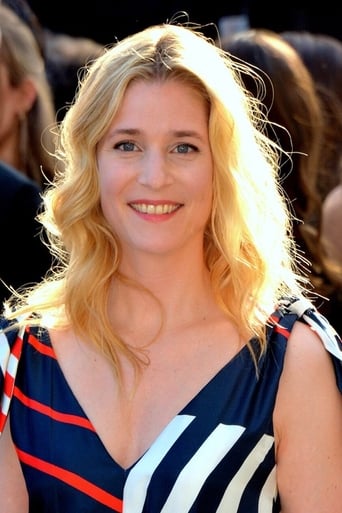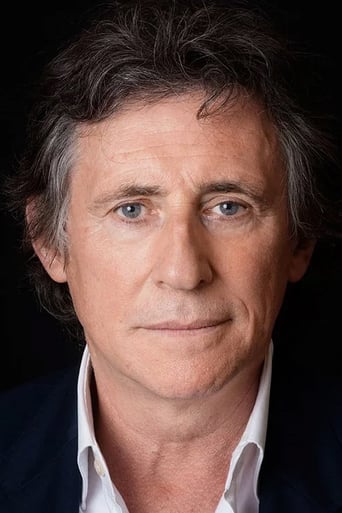Capital (2013)
The head of a giant European investment bank desperately clings to power when an American hedge fund company tries to buy them out.
Watch Trailer
Cast


Reviews
Memorable, crazy movie
Am i the only one who thinks........Average?
Great story, amazing characters, superb action, enthralling cinematography. Yes, this is something I am glad I spent money on.
This is a dark and sometimes deeply uncomfortable drama
When the CEO of France's Phenix Bank collapses on the golf course, a young bank executive, (Gad Elmaleh) becomes a temporary CEO. He'd like to be permanent, but he realizes right away that there is a very different agenda in play. An American hedge fund leader, Dittmar Rigule (Gabriel Byrne) is calling the shots and wants Phenix to purchase a worthless Japanese company, for one thing. If he does this, Phenix becomes worthless and the Americans can buy it for next to nothing. That's just one of his problems. His enemies attempt to distract him using a gorgeous model (Liya Kebede), whom he chases around the world. Elmaleh plays an antihero who is just as bad as everyone else with his wheeling and dealing, ambition, and disregard for the lives of others. He tells the stockholders that he is like Robin Hood, robbing from the poor to make the rich richer. It's what they all do. It's all a game, he tells someone at the end, and they're all children. They'll have fun until it all goes wrong. Meanwhile he travels, stays in the best places, and cheats on his wife.I read a few critiques of this, that it's too light and should have been darker. But it's based on "Das Kapital" by Karl Marx and works in Marx's ideas. Some of it seems caricatured and clichéd, but it's really just drawing on an ideology put forth by Marx and Mao Tse Tung. Like all of these corporation/banking films and documentaries, it's depressing. Last night I saw a film called "Common" where a woman's son is killed. She is getting money, but not in time to bury him, so she tries to borrow it from a bank. She can't. No, she can't, but everyone just piled money on Enron when they had nothing but dummy corporations and no product. Just threw money at them.I have to think, as Costa-Gravas seems to, that someday this will all go amuck, though in some situations, it already has -- the housing industry, Enron, Bernie Maddock, reported to the SEC countless times, but no one could be bothered to do anything about it -- and on and on. I don't have any answers. Well, I do, actually. The answer is Greed.
Very interested 2012 French film by Costa Garvas. Shows how a large French bank operates in the world's financial market and how it integrates into the international banking system. An aging CEO is replaced by a younger executive. He finds himself with a lot of internal and external pressures. Some scenes of it reminds of Wall Street 2. A different approach to the financial market at a fast pace, in some moments too fast to follow and grasp. Also shows the relationships between the different executives and its lower level employees when the new CEO starts laying off people to tune up the finances of the bank with ruthless practices and little concern about employees needs and their respect. Worth while seeing.
When the executive director of a French bank orders his boy squad to commit insider trading in order to save the French bank from getting sharked by a Miami hedge fund, who happen to also be the French-American connection dudes (American board members) from the same French bank, he not only gets away with it, by presenting la evidence of the Miami crooks to La Securities and Exchange Commission in New York, he is also reaffirmed as the new tru CEO and receives the Médaille d'honneur pour acte de courage et de dévouement from the French President. In their banking world the equal of saving The President as that medal of honor decorated Secret Service agent in White House Down. Sadly this doesn't happen of course, as, how clear the due diligence of a Secret Service agent can be, the due diligence of a Banker CEO is never revealed. Its evident that inside Le Capital the French Presidential Decoration also never happens. On his way in saving the French Bank he not only hires his personal ex-Commissaire de police for the collection of insider information, several decoys and bogies pop-up like a severely heroin addicted American fashion model. For the viewer another bogy is on the road, as the spoken language is freaking fast French, which your closed caption subtitles are hardly able to keep pace with.
It's interesting that Costa-Gavras chose to make a personal diatribe against finance through his "Capital" since he's most renowned for his politically-oriented themes that contributed to such memorable movies as "Z" or "Missing". I say 'interesting' because "The Capital" reminded me of another finance-themed film from another political director: Oliver Stone's "Wall Street", THE movie that summed up the inner amorality of finance through the iconic : 'Greed, for a lack of better word, is good'I wasn't surprised that the political director made his cinematic "J'accuse" against finance, since it proved to be true ruler of our liberal world, whose only alibi for existence is to pretend there's no better alternative. After the economical crisis, the Goldman Sachs and Bernard Madoff' cases, after the French President claimed to have made finance his enemy, finance was definitely political matter, and if Costa-Gavras makes a film about it, it's certainly worth our attention. The question is: what would the film show that "Wall Street" didn't? (and this comes from someone who didn't even watched its sequel, "The Wolf of Wall Street" or "Margin Call", not yet)I expected the most overused clichés from "The Capital", the young ambitious yuppie (Gad El Maleh) riding a fast ascension, his discovery of a world of corruption, lust and greed, ethical dilemmas, probable redemption etc. And the casting of Gad El Maleh didn't comfort my thoughts. Gad (as he's generally called) is one of the most popular comedians in France, but his transition from stage to cinema didn't bring much positive results. His "Chouchou" and "Coco", both cinematic adaptations of popular sketches were critically panned, much more; Gad never really struck as a serious comedian, and was never considered an equal to Jean Dujardin or Vincent Cassel, to give you an idea.Then I looked at the trailer and was already cringing at his crisped face, he was obviously trying to inhabit the gravity of the subject by playing the tough-guy, and if it doesn't work for Di Caprio, it's even worse for him. The trailer gave away the most archetypal situations, the corrupt bankers, the cynical American, the sexy top-model, the fast-paced editing and the obligatory round trips between Paris, New York, London and Tokyo. I really didn't expect much, and watching the film was almost accidental. The film was a commercial bomb, and even Gad's popularity didn't help, or were people tired of the subject? I guess I wanted to see where I would stand for, and my expectations were so low they could only be positively contradicted.The first good point relies on the straight-forward narrative, Marc Tourneuil (Gad El Maleh) is not the Boy Scout that would make a perfect puppet for his hierarchy: he understands the malevolent schemes behind his nomination as a CEO of Phenix bank, replacing the former, cancerous President. He knows he has the opportunity of a lifetime to win money and be the master of his own actions. That's a first deviation from the usual 'selling-soul-to-the-devil' plot and it was quite refreshing to see a character who already embraced the cynicism of his environment. The film turns immediately into a chess game involving Tourneuil, the board members, the head of an American hedge fund (Gabriel Byrne), and in a zero-sum game, we expect only one winner.Indeed, it doesn't take a MBA degree to understand the plot, complex but not contrived. In a nutshell, it's all about finding the tricks to distract the French government from a plan of mass-layoffs in order to increase Phenix' profitability, there are many cases of insider trading, of political maneuvers, fiscal exits and such expectable lines as 'money never sleeps'. The film tries to cover every aspect of finance, succeeding by not making it feel too forced or cliché. However, this owes more to the story than the acting or the script. Gad delivers a fine performance but there are moments where his character didn't exactly know what to do, and I suspect it was the actor lacking the right direction. Gad proved to be an actor of fair capabilities and his performance alternates between some powerful outbursts to awkward lines' deliveries where he's never totally Gordon Gekko, and can't convince as a Buddy Fox.It's regrettable because Costa-Gavras had the material for a good film, not the most subtle one, but for a gripping thriller and fair entertainment. Yet he polluted it with some unnecessary subplots such as a dull romance with a top model. The film skates over the difficult compatibility between Marc's job and his private life, there are some moments with his wife and his family that could have been fueled with more energy and self-questioning, after all, wouldn't we be interested to see a businessman with a family, for once he's not the lone wolf, young and single. Marc's wife could have added more to the story, allowing her to deviate from "Wall Street" formula but she was too underdeveloped and it's only between Gad and Byrne that the script revealed its few strengths.Now, I'm more perplexed regarding the fourth-wall breaking moments. It might be a promising concept on the paper to have the protagonist address us, making us wondering if he's really enjoying or disdaining the game he's playing. I think it's up to the actor to make the thing believable or out-of-place, it worked at the ending of "Goodfellas" because Ray Liotta had that liveliness in his eyes, the intensity in the narration that immediately grabbed our attention. Gad talks in a too much laconic voice and really seems like reading lines without believing in them. Anyway, I expected more flamboyance from a modern Robin Hood.These technical aspects highlight the flaws in the script, that mixed up the words 'insightful' and 'preachy', whether it's to tell us that finance is bad or necessary (or both), we simply wonder if there is something the film shows we didn't already know.







